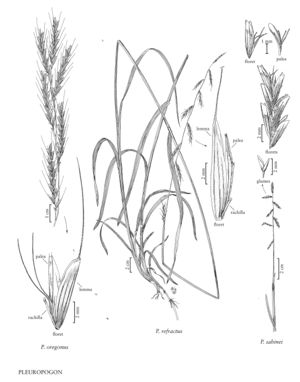Difference between revisions of "Pleuropogon refractus"
FNA>Volume Importer |
imported>Volume Importer |
||
| (8 intermediate revisions by 2 users not shown) | |||
| Line 4: | Line 4: | ||
|publications= | |publications= | ||
|common_names=Nodding semaphoregrass | |common_names=Nodding semaphoregrass | ||
| + | |special_status={{Treatment/ID/Special_status | ||
| + | |code=E | ||
| + | |label=Endemic | ||
| + | }} | ||
|basionyms= | |basionyms= | ||
|synonyms= | |synonyms= | ||
| Line 17: | Line 21: | ||
-->{{Treatment/Body | -->{{Treatment/Body | ||
|distribution=Calif.;Oreg.;Wash.;B.C. | |distribution=Calif.;Oreg.;Wash.;B.C. | ||
| − | |discussion=<p>Pleuropogon refractus grows in wet meadows, riverbanks, and shady places, from sea level to about 1000 m. Its range extends from British Columbia south to California.</p> | + | |discussion=<p><i>Pleuropogon refractus</i> grows in wet meadows, riverbanks, and shady places, from sea level to about 1000 m. Its range extends from British Columbia south to California.</p> |
|tables= | |tables= | ||
|references= | |references= | ||
| Line 26: | Line 30: | ||
-->{{#Taxon: | -->{{#Taxon: | ||
name=Pleuropogon refractus | name=Pleuropogon refractus | ||
| − | |||
|authority=(A. Gray) Benth. ex Vasey | |authority=(A. Gray) Benth. ex Vasey | ||
|rank=species | |rank=species | ||
| Line 33: | Line 36: | ||
|basionyms= | |basionyms= | ||
|family=Poaceae | |family=Poaceae | ||
| + | |illustrator=Linda Ann Vorobik;Hana Pazdírková | ||
| + | |illustration copyright=Utah State University | ||
|distribution=Calif.;Oreg.;Wash.;B.C. | |distribution=Calif.;Oreg.;Wash.;B.C. | ||
|reference=None | |reference=None | ||
|publication title= | |publication title= | ||
|publication year= | |publication year= | ||
| − | |special status= | + | |special status=Endemic |
| − | |source xml=https:// | + | |source xml=https://bitbucket.org/aafc-mbb/fna-data-curation/src/200273ad09963decb8fc72550212de541d86569d/coarse_grained_fna_xml/V24/V24_139.xml |
|subfamily=Poaceae subfam. Pooideae | |subfamily=Poaceae subfam. Pooideae | ||
|tribe=Poaceae tribe Meliceae | |tribe=Poaceae tribe Meliceae | ||
Latest revision as of 16:22, 11 May 2021
Plants perennial; not cespitose, rhizomatous. Culms (85)100-150 cm, erect. Sheaths glabrous or pubescent, sometimes scabrid¬ulous; ligules 2-7 mm; blades 10-40 cm long, 5-14 mm wide, apices acute or acuminate and sharply mucronate, flag leaves often reduced to spinose tips. Racemes (10)20-35 cm, with 6-14 spikelets; internodes 2-5.6(8) cm; pedicels 2-3 mm long, reflexed at maturity. Spikelets (20)25-28 mm, pendent, with 7-14 florets, usually all but the terminal floret bisexual. Glumes frequently scabrous, apices obtuse, sometimes erosely notched; lower glumes 3-6 mm; upper glumes 4-7(8.3) mm, 3-veined; rachilla internodes 2-3 mm long, about 0.1 mm thick, bases sometimes weakly differentiated into a glandular swelling; lemmas 8-10 mm, faintly 7(9)-veined, lateral veins occasionally prominent, apices truncate, sometimes toothed, awned, awns (5)9-20 mm; paleal keels each with a 0.2-0.6(1) mm triangular appendage; anthers 3.5-4 mm. Caryopses 4.5-6 mm. 2n =32, 36.
Distribution
Calif., Oreg., Wash., B.C.
Discussion
Pleuropogon refractus grows in wet meadows, riverbanks, and shady places, from sea level to about 1000 m. Its range extends from British Columbia south to California.
Selected References
None.
